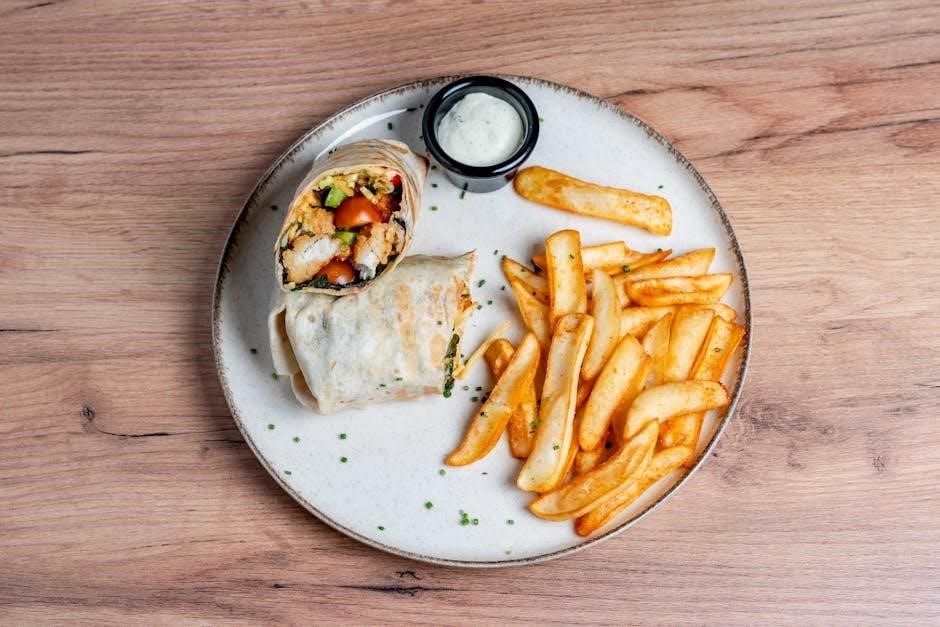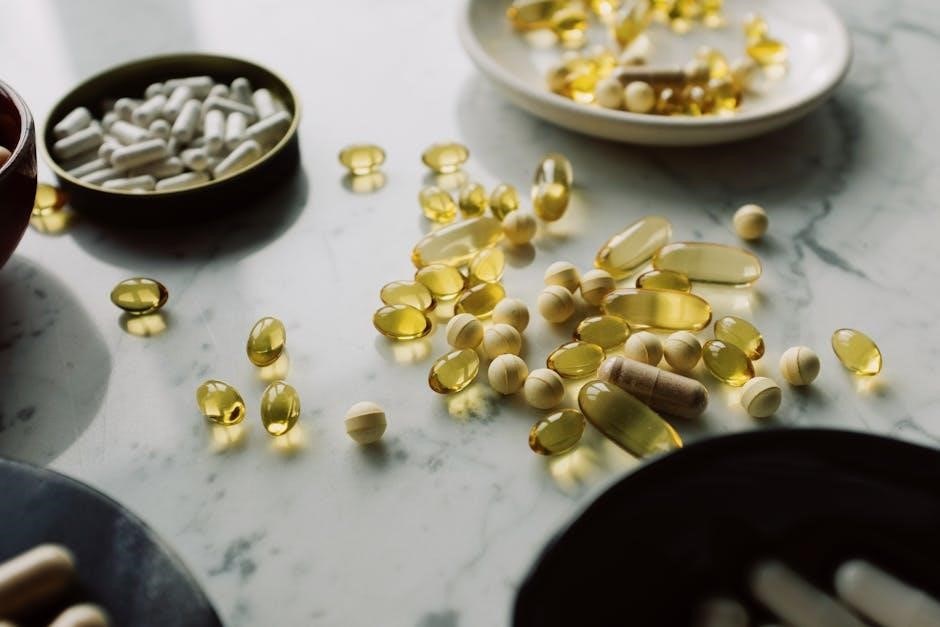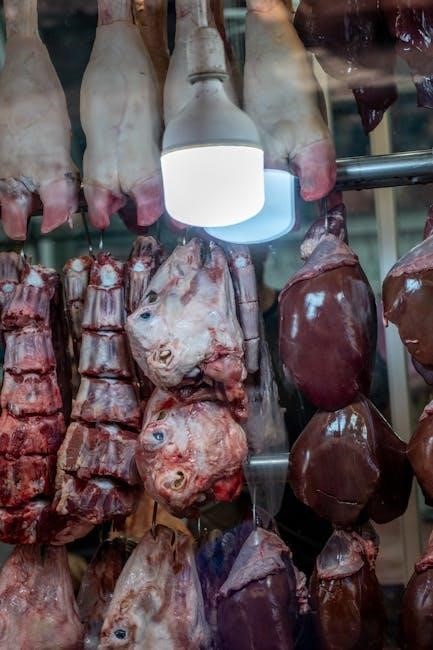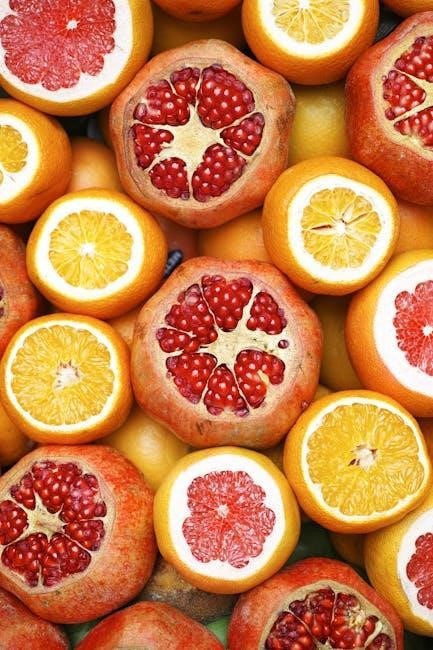A fatty liver diet is crucial for managing Non-Alcoholic Fatty Liver Disease (NAFLD)‚ focusing on specific foods to reduce liver fat and improve overall health.
1.1 Understanding Non-Alcoholic Fatty Liver Disease (NAFLD)
Non-Alcoholic Fatty Liver Disease (NAFLD) is a condition where excess fat accumulates in liver cells‚ unrelated to alcohol consumption. It is closely linked to obesity‚ insulin resistance‚ and metabolic syndrome. NAFLD ranges from simple steatosis (fat accumulation) to more severe forms like steatohepatitis‚ fibrosis‚ and cirrhosis. Early stages are reversible with lifestyle changes‚ but prolonged fat buildup can lead to irreversible liver damage. Understanding NAFLD is crucial for implementing effective dietary and lifestyle modifications.
1.2 Importance of Diet in Managing Fatty Liver
Diet plays a central role in managing NAFLD‚ as it directly impacts liver fat accumulation and overall health. A well-structured fatty liver diet helps reduce liver inflammation‚ promote weight loss‚ and lower triglyceride levels. By focusing on nutrient-rich foods and avoiding harmful substances like processed sugars and trans fats‚ individuals can significantly improve their condition. A Mediterranean-style diet is often recommended‚ emphasizing whole grains‚ lean proteins‚ and healthy fats‚ which supports liver health and metabolic balance.

Best Foods to Eat for Fatty Liver
Include lean proteins‚ healthy carbs‚ and beneficial fats to support liver health. Opt for whole grains‚ fruits‚ vegetables‚ and legumes to promote balanced nutrition and fat reduction.
2.1 Lean Protein Sources
Lean proteins are essential for reducing liver fat and promoting overall health. Opt for skinless poultry‚ lean cuts of beef‚ fish‚ and plant-based options like legumes and tofu. These proteins help minimize fat accumulation in the liver while providing essential nutrients. Avoid processed meats and high-fat animal products. Incorporating these into meals supports weight management and improves metabolic function‚ crucial for managing fatty liver disease effectively.

2.2 Healthy Carbohydrates
Healthy carbohydrates‚ such as whole grains‚ fruits‚ vegetables‚ and legumes‚ provide essential fiber‚ vitamins‚ and minerals. These foods help regulate blood sugar levels and promote fat metabolism‚ reducing liver fat accumulation. Opt for low-glycemic options like oats‚ quinoa‚ and non-starchy vegetables. Avoid refined sugars and processed carbs‚ which can exacerbate fatty liver. Incorporating these carbs supports weight management and improves insulin sensitivity‚ both critical for managing NAFLD effectively.
2.3 Beneficial Fats
Beneficial fats‚ such as avocados‚ nuts‚ seeds‚ and olive oil‚ are essential for liver health. These fats support cell function and reduce inflammation without contributing to liver fat buildup. Omega-3 fatty acids from fatty fish like salmon and mackerel also improve liver function and reduce triglycerides. Avoid saturated and trans fats‚ which can worsen fatty liver. Incorporating healthy fats in moderation helps maintain a balanced diet and supports overall liver wellness in managing NAFLD effectively.

Foods to Avoid
Avoid processed foods‚ sugary drinks‚ and alcohol‚ as they contribute to liver fat accumulation and inflammation. These foods hinder liver function and weight loss efforts.
3.1 Processed Foods
Processed foods are high in unhealthy fats‚ added sugars‚ and sodium‚ which can worsen liver fat accumulation. They often contain artificial additives and preservatives that promote inflammation. Regular consumption of processed foods like baked goods‚ frozen meals‚ and snack foods can lead to insulin resistance and metabolic issues‚ further exacerbating NAFLD. Limiting these foods is essential to reduce liver strain and support overall health. Opting for fresh‚ unprocessed ingredients helps maintain a liver-friendly diet.
3.2 Foods High in Added Sugars
Foods high in added sugars‚ such as sodas‚ pastries‚ and sweetened beverages‚ can lead to insulin resistance and fat accumulation in the liver. Consuming excessive sugar promotes inflammation and worsens NAFLD symptoms. It’s important to check nutrition labels for hidden sugars in foods like condiments and processed snacks. Reducing sugar intake helps lower triglyceride levels and supports liver health. Opt for natural sources of sweetness‚ like fruits‚ to satisfy cravings while protecting your liver.
3.3 Alcohol Consumption
Alcohol consumption exacerbates fatty liver disease by damaging liver cells and promoting inflammation. Even moderate alcohol intake can worsen NAFLD and lead to more severe liver damage. Complete abstinence from alcohol is strongly recommended to prevent further progression of the disease. Reducing or eliminating alcohol helps the liver recover and regenerate‚ which is crucial for managing NAFLD effectively. Avoiding alcohol is a key component of a fatty liver diet and overall liver health strategy.

Sample 7-Day Fatty Liver Diet Meal Plan
A structured 7-day meal plan provides balanced nutrition‚ focusing on liver-friendly foods to support weight management and reduce liver fat accumulation effectively.
4.1 Overview of the Meal Plan
This 7-day fatty liver diet meal plan is designed to provide balanced nutrition‚ focusing on lean proteins‚ whole grains‚ fruits‚ vegetables‚ and healthy fats. It avoids processed foods and added sugars‚ promoting weight loss and improved liver function. Each day includes three main meals and snacks‚ ensuring a variety of flavors and nutrients. The plan is customizable to suit individual preferences and dietary needs‚ offering a sustainable approach to managing NAFLD through dietary changes.
4.2 Sample Menu for Each Day
Day 1: Oatmeal with berries and almond milk for breakfast‚ grilled chicken salad with avocado for lunch‚ and baked salmon with steamed vegetables for dinner. Snacks include raw nuts and fruit.
Day 2: Scrambled eggs with spinach‚ whole-grain toast‚ and a smoothie. Lunch features quinoa and turkey‚ while dinner includes roasted chicken and sautéed greens. Snacks are apple slices with peanut butter.
Days 3-7 follow a similar pattern‚ rotating proteins‚ whole grains‚ and colorful vegetables to ensure variety and nutrient balance‚ avoiding processed foods and added sugars.

Exercise and Physical Activity
Regular exercise‚ such as 30 minutes of aerobic activity most days‚ helps manage weight and reduce liver fat‚ improving fatty liver condition effectively.
5.1 Benefits of Exercise for Fatty Liver
Exercise plays a vital role in managing fatty liver disease by improving fat metabolism‚ enhancing insulin sensitivity‚ and reducing inflammation. Regular physical activity helps burn excess fat‚ particularly in the liver‚ and promotes weight loss‚ which is crucial for reversing NAFLD. Aerobic exercises‚ such as walking or swimming‚ and strength training are recommended to improve overall liver health and metabolic function‚ contributing to a healthier lifestyle and better disease management.
5.2 Recommended Types of Exercise
For fatty liver management‚ a combination of aerobic and strength-training exercises is recommended. Aerobic activities like walking‚ swimming‚ or cycling help burn fat and improve insulin sensitivity. Strength training‚ such as weight lifting or bodyweight exercises‚ builds muscle mass‚ which further enhances metabolism. Aim for at least 30 minutes of moderate-intensity exercise most days of the week. Consistency is key to reducing liver fat and improving overall health.

Weight Management Strategies
Weight management is essential for reducing liver fat and improving overall health. A healthy diet combined with regular exercise supports sustainable weight loss and maintenance.
6.1 Importance of Weight Loss
Weight loss is crucial for reducing liver fat and improving fatty liver disease. Even a 7-10% reduction in body weight can significantly improve steatosis and decrease inflammation. Maintaining a healthy weight helps lower liver enzymes‚ reduce fat accumulation‚ and prevent disease progression. It also enhances metabolic function and overall health. Sustainable weight loss through diet and exercise is recommended for long-term benefits and liver health improvement.
6.2 Tips for Maintaining a Healthy Weight
Maintaining a healthy weight is essential for managing fatty liver disease. Focus on a Mediterranean-style diet rich in whole grains‚ fruits‚ vegetables‚ and lean proteins. Avoid processed foods and added sugars. Practice portion control and stay hydrated. Incorporate regular physical activity‚ such as walking or strength training‚ to support weight management. Aim for balanced meals throughout the day to maintain energy levels and prevent overeating‚ promoting long-term weight stability and improved liver health.

Monitoring Progress and Adjustments
Tracking liver enzyme levels and imaging results helps assess progress. Regular check-ups with a healthcare provider ensure adjustments to the diet and exercise routine for optimal results.
7.1 Biomarkers to Track
Monitoring liver health involves tracking key biomarkers such as liver enzymes (ALT‚ AST)‚ triglycerides‚ LDL cholesterol‚ and blood glucose levels. These measurements help assess disease progression and response to dietary changes. Regular blood tests and imaging studies‚ like ultrasound‚ are essential for evaluating liver fat accumulation and inflammation; Tracking these biomarkers ensures adjustments to the diet and lifestyle can be made promptly to improve liver function and overall health effectively.
7.2 Regular Medical Check-Ups
Regular medical check-ups are vital for monitoring liver health and ensuring the effectiveness of dietary changes. Blood tests and imaging studies help track improvements in liver function and fat reduction. A healthcare provider can adjust the treatment plan based on progress and address any concerns. These check-ups also enable early detection of potential issues‚ ensuring timely adjustments to lifestyle and diet for optimal liver health and long-term well-being.
Adhering to a fatty liver diet promotes liver health and overall well-being. Consistent lifestyle changes and dietary adjustments can effectively manage NAFLD and prevent complications‚ ensuring long-term benefits.
8.1 Summarizing the Fatty Liver Diet Approach
The fatty liver diet approach focuses on reducing liver fat through strategic dietary changes. It emphasizes lean proteins‚ healthy carbs‚ and beneficial fats while limiting processed foods and added sugars. Regular physical activity‚ weight management‚ and avoiding alcohol are also key components. This balanced plan helps improve liver function‚ promote weight loss‚ and prevent disease progression. By adhering to these guidelines‚ individuals can effectively manage NAFLD and enhance their overall health.

8.2 Encouragement for Long-Term Adherence
Adhering to a fatty liver diet requires commitment‚ but the benefits are rewarding. Small‚ consistent changes can lead to significant improvements in liver health and overall well-being. Tracking progress and celebrating milestones helps maintain motivation. Seeking support from healthcare providers or support groups can also foster long-term success. Remember‚ a balanced diet and active lifestyle are key to reversing NAFLD and preventing future health complications. Stay dedicated for a healthier‚ happier you.

Leave a Reply